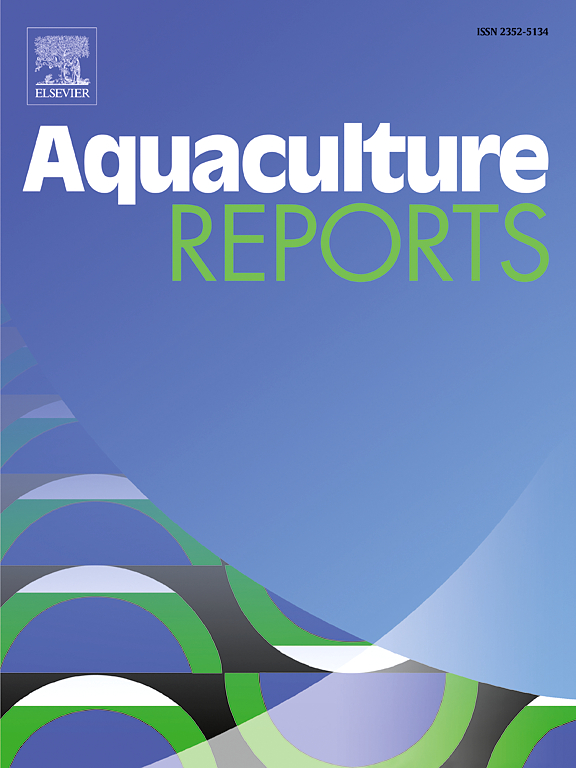肝胰脏转录组分析揭示了蛤对高温的适应机制
IF 3.7
2区 农林科学
Q1 FISHERIES
引用次数: 0
摘要
温度是调节蛤蜊生长和生存的重要环境因素。为了研究蛤蚌在急性高温胁迫下的分子变化,我们进行了转录谱分析。在不同温度下(26℃、30℃和34℃)培养24 h。然后收集肝胰脏组织进行rna测序。与CsHe26组(对照组)相比,CsHe30组鉴定出339个差异表达基因(deg),其中上调176个,下调163个;CsHe34组鉴定出649个差异表达基因(deg),其中上调329个,下调320个。Go和KEGG分析显示,DEGs主要参与氧化还原酶活性、蛋白质加工和折叠以及丝裂原活化蛋白激酶(MAPK)信号通路。qRT-PCR分析结果显示,15个deg的表达模式与rna测序数据相当,表明其可靠性。此外,我们发现Caspase3和p38 MAPK上调,表明细胞凋亡增加。TUNEL染色实验进一步证实了这一点,高温应激增加了肝胰腺中凋亡细胞的数量。总之,本研究为了解全球变暖背景下蛤蜊高温适应的分子基础提供了宝贵的数据资源,并可能有助于确定耐热候选基因,为培育耐热蛤蜊菌株提供潜在的靶点。本文章由计算机程序翻译,如有差异,请以英文原文为准。
Hepatopancreas transcriptome analysis reveals the adaptation mechanism to high temperature in the clam Cyclina sinensis
Temperature is an importantly environmental factor that regulates the growth and survival of clams. To investigate the molecular changes in response to acute high-temperature stress in clam Cyclina sinensis, we conducted a transcriptional profiling. In this study, clams were cultivated at different temperature (26℃, 30℃ and 34℃) for 24 h. Hepatopancreas tissues were then collected for RNA-sequencing. Compared with the CsHe26 group (control group), 339 differentially expressed genes (DEGs) were identified in CsHe30 group containing 176 upregulated DEGs and 163 downregulated DEGs, and 649 DEGs were identified in CsHe34 group including 329 upregulated DEGs and 320 downregulated DEGs. The Go and KEGG analysis showed that DEGs were mainly involved in oxidoreductase activity, protein processing and folding, and mitogen-activated protein kinase (MAPK) signaling pathway. The analysis result of qRT-PCR showed that the expression patterns of 15 DEGs were comparable to the RNA-sequencing data indicating the reliability. Moreover, we found that Caspase3 and p38 MAPK were upregulated suggesting increased cell apoptosis. This was further evidenced by the TUNEL staining assay, which showed that high temperature stress increased the number of apoptotic cells in hepatopancreas. Overall, this work provides a valuable data resource for understanding the molecular basis of high-temperature adaptation in clams in the context of global warming and may contribute to identifying heat-tolerant candidate genes which provide potential targets for breeding heat-resistant clam strains.
求助全文
通过发布文献求助,成功后即可免费获取论文全文。
去求助
来源期刊

Aquaculture Reports
Agricultural and Biological Sciences-Animal Science and Zoology
CiteScore
5.90
自引率
8.10%
发文量
469
审稿时长
77 days
期刊介绍:
Aquaculture Reports will publish original research papers and reviews documenting outstanding science with a regional context and focus, answering the need for high quality information on novel species, systems and regions in emerging areas of aquaculture research and development, such as integrated multi-trophic aquaculture, urban aquaculture, ornamental, unfed aquaculture, offshore aquaculture and others. Papers having industry research as priority and encompassing product development research or current industry practice are encouraged.
 求助内容:
求助内容: 应助结果提醒方式:
应助结果提醒方式:


